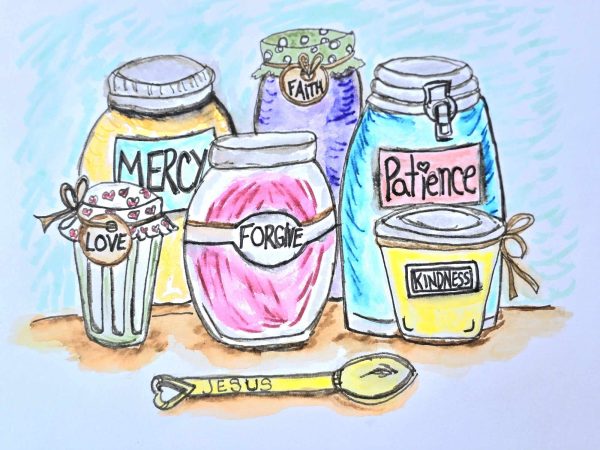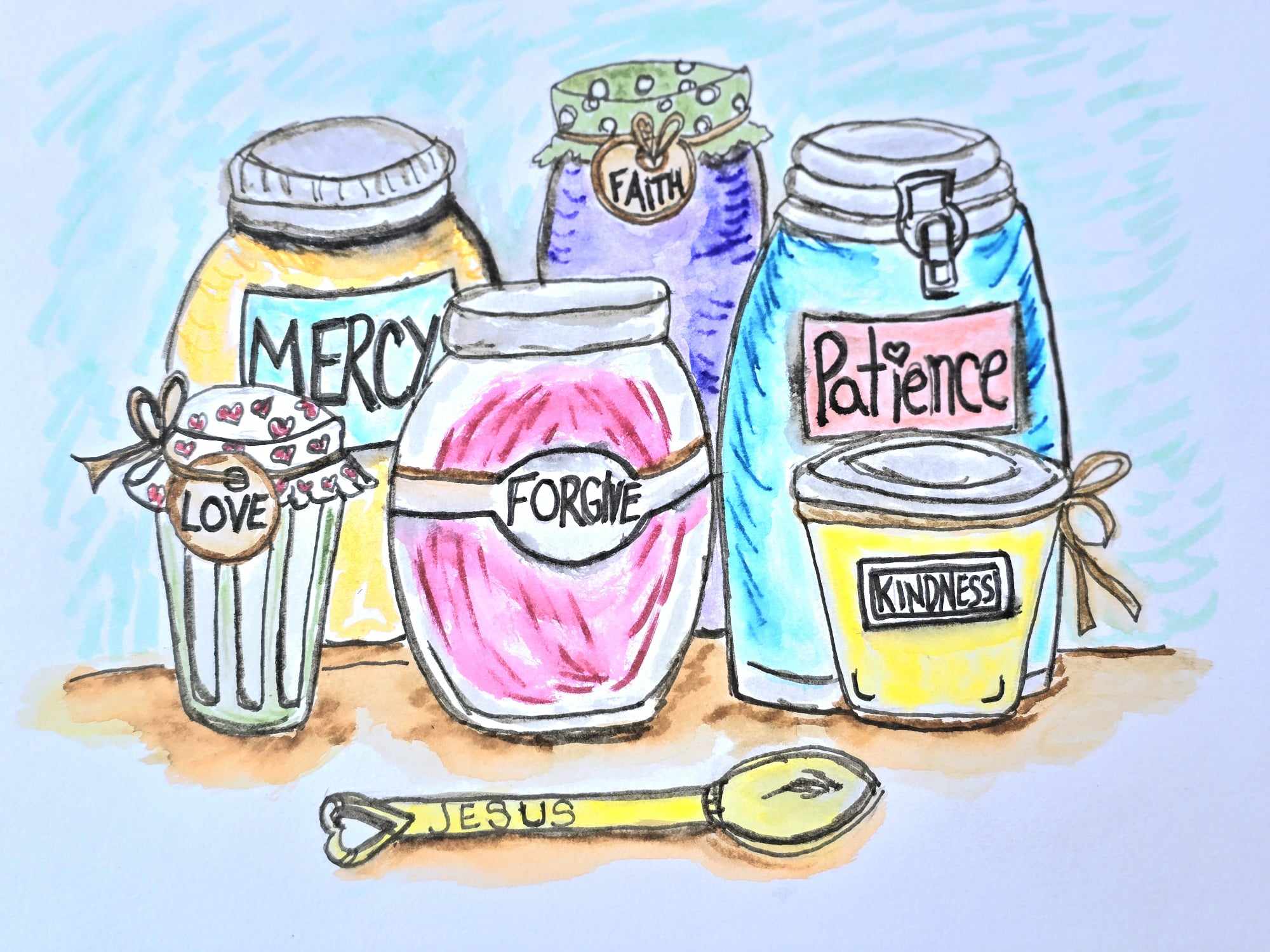Have you ever noticed how you sometimes react to comments or actions of others in negative or even offensive ways and can’t figure out exactly why you behaved that way? Most may feel that this is how you were on this occasion and accept you regardless because you aren’t that way all the time. On the other hand, if you are continually reacting this way with the same person, it could lead to the end of an otherwise fruitful relationship.

“Spoon Full of Jesus” watercolor by Amy J Heath
In my experience, I have noticed for some time how I react to comments by others that offer what I take as a personal criticism of something I said or did, my tendency is to avoid further discussion with that person before that criticism I suspect is forthcoming when it might not have occurred after all. Years ago, a fellow employee at Boeing where I was employed at that time, called me aside and told me that I was too impersonal. She did not explain what she meant even when I pressed her for an explanation. That encounter has bothered me over the years as I have searched within myself as to whether her criticism was true, and if true, what could I do about it?
I have also commented before in my articles about what I have labelled in our personalities as the “blame paradox”. In that phenomenon, our bodies are equipped a surge of adrenaline in situations caused by stress encounters whether an extreme physical exertion is required or even when you may be faced with the need of that surge of energy emotionally to help extricate yourself from an unusually unknown or unexpected occurrence. That adrenaline surge capacity was built into our created design for usually a temporary time for the confrontation and resolution. I have found from my own experiences that the statement, “the greatest and the worst in life are in the expectation”.
The advantage of such a production of energy is extremely helpful in accomplishing a purely physical task. However, in confrontational situations that rush of adrenaline causes an emotion that is often confused in your own identification and recognition of the feeling in the process of justification of your chosen response to that situation, even when the confrontation is merely caused by your reaction even when no energy using task is required.
You may have noticed this phenomenon in your reaction to carelessly knocking over a container spilling liquid all over the floor, or when the person you are speaking with has called you out as the responsible one in an unexpected conflict. In that latter case the term “blames” is an accurate description of your emotional response that your body’s adrenaline rush has generated. In such a rush of emotion you may fire away with accusing words against the other person or, worse yet, cause some physical contact such as a push or even an injury in the altercation.
The problem from some of my own experiences in a variety of situational encounters of the consequences of my own inattention to the true cause of the problem can lead to an unpleasant encounter in the reaction by each of us. I will share a testimony of a very recent encounter that illustrates how you can very easily lose control of that adrenaline rush, and an innocent mistake or an erroneous assumption by either person or both can easily lead to an unanticipated attitudinal counter- attack against the other person or one against the other.
My wife and I needed to purchase a few landscape rocks to be placed in front of a large yard plant viewable at the front of our home. The ones advertised on line were unsuitable as to either size or shape but we found a local landscaping supply service that had a huge and varied display of decorative rocks separated by type and size and labelled for sale, but no prices were indicated at each location. At the facility you could drive around in front of each display, stop, inspect and decide which ones you wanted. The procedure for selection and payment was to drive your car onto a scale where it is weighed before the rocks are added and then after you load the selected rocks you drove the loaded car back on the scale from which weight, someone in the inside office computes your charge for the rocks selected and payment can be made. We weighed our empty vehicle and then drove around to the pile of rocks we liked and stopped to select and load the number we needed. As we started this process, having stopped in front of one section of the display that had very large piles of the same sized rocks, a man from the office came almost running down to where we were in the process of loading and began in effect shouting in what sounded like an angry tone, “you can’t take those rocks, they are for commercial large load deliveries”! Being frustrated at this confrontation, I felt a rush of adrenaline rise up in my emotions and in effect shouted back, “What do you mean? There is no sign saying that and no one in the office said anything about any restriction on our rock category and location! You should at least have signs! So, which ones can we select from?” He pointed out the area where we could select from, never changing in affect his accusatory tone toward our apparent ignorance and abruptly turned around and stalked back to the office without saying another word. We found our rocks, loaded them in the car, drove back to the scales, paid and left.
The lesson I learned from this experience was to always be prepared to recognize that adrenaline rush when inappropriate to the task at hand, set it emotionally aside and not let it take control of my responses to this kind of controversy. God has given you the capacity to do that and learn from the experience to be better next time. For these type situations, I think the Socratic Method approach is best by asking questions without a counter accusation especially in tone of my voice. Then amazingly the other person will usually answer your questions and see that their own approach was not appropriate, because the answer to my question will often lead them to see their own mistakes and will they will try to cooperate rather than accuse.
Getting back to the cause of this phenomenon in human encounters with respect to personal criticism, it has taken me most of my life to discover the most likely cause of my propensity to react to criticism with an emotional surge of either a raised voice level or the decision to distance myself from that situation or, worse yet, even consider ending the relationship.
I was raised in a stable family environment as the fourth child of a long marriage of my parents which lasted until the first death, my father’s. We were Methodists by denominational church tradition and attended services weekly in our small north Florida town where everyone knew and respected each other’s rights and responsibilities.
My father didn’t get married until he was 45 years of age and probably did so on the advice of his local banker who introduced him to my mother who was employed in the bank. Mr. Pat Monroe, the bank president allegedly told my father, “Potter, I think it’s about time you got married!”. MY father allegedly told him, “Mr. Pat, I don’t know anyone who would have me!” Mr. Monroe, allegedly replied, “Potter, there is a nice young woman who works for me here in the bank, I think you should marry her!” My father took his advice and they were married and I was born four years later as their fourth child, the first two being twins.
From the best I can remember from conversations with my father, he had a rejection in his young life when his father married the fiancé of his deceased older brother. His first wife—my father’s mother—had become prematurely deceased. My father apparently made such a fuss over that announced decision by his father that he was forced to move out of the family home and find a way to live his life on his own. He apparently felt so rejected that until the age of 45 he had never had a serious relationship with a woman in order to get married until Mr. Monroe persuaded him to take that chance. He then did, and my life came into being.
Whether that was the true cause of his life directional change or not, my father became a successful shade tobacco farmer and for one substantial period of his life, served unopposed as a County Commissioner for 15 years or so. In growing up, I spent countless hours with him doing the things he liked to do such as hunting, finishing and even watching professional baseball games on TV, that finally became available in that area. He was totally in control of his family and anything else in which he had an interest if it was something he could influence. He was a partner in two different businesses related to his extensive farming operations. However, he never shared with me or anyone else to my knowledge of what he personally thought about other even personal things.
I was never spanked for my misbehavior because it was never necessary. Just a look of displeasure from my father would bring about the total control of my behavior. In growing up, I never challenged any thought or issue of personal differences. I recall one incident when I was about eight years of age that left a lasting impression on my decision making. We lived on a farm three miles from the little town of Havana, Florida. My older brother had gone into town one Saturday to play baseball with a friend and for some reason, I can’t recall why, I was left at home with only the lady who served as a housekeeper and cook was present. My sisters, my father and mother were away from home. I was lonesome and probably bored and decided to get on my bike and ride into town to find my brother at his and his friend’s baseball game. I never found them at their game and made my way back home three miles away from town. By the time I made it back home on my bicycle, all the others had returned and wondered where in the world John was. My mother was so upset but she was a loving person and just hugged me in the joy of discovering I was finally home safe. My father said nothing but his look was so accusatory that I was frightened almost out of my wits. My brother and two sisters just laughed and made fun of my stupidity, as I felt it anyway. I can still feel it and the memory of that episode has remained until this day.
After a lifetime of living, stimulated by these types of experiences from my youth, it left me with a consistent deep-down fear of rejection, even in its milder aspects as any form of criticism. I firmly now believe this was the cause of my difficult to control consistent behavior to avoid risk of this kind of response from anyone or any threatening situation.
Later in my life I became a lawyer and worked in that stressful arena for almost 50 years where the prospect of criticism and rejection of your side’s perspective is a continual expectation. My remedy for the discomfort was usually to procrastinate as long as possible in making decisions that would lead to a controversy. In approximately 2001, while reading and studying a book by Dr. Ernest White entitled Christian Life and the Unconscious, I came to the conclusion that my reaction to the fear of criticism and stress was sin and that God’s solution was to confess my fear, believe I was forgiven as He promises us He will, and then, most importantly, to act in trust that God would be with me no matter what the outcome.
As I put what I learned from this lesson into practice, the cloud of oppression or sin from the avoidance of the risk of controversy inhibiting my actions was lifted. Unfortunately, although my professional life was so well managed by God’s solution, I have continued to be faced in personal confrontations with my wife and others that I explained earlier in this article. Recently it occurred to me that my emotional response to confrontation with other persons was due to this irrational physical adrenaline production phenomenon and the beautiful lesson I have learned is that being aware of this as it occurs, God has given you the power with His help to set that blame feeling aside and continue in the conversation or the physical task without it.
I do not begin to suggest that every person reading this article will have the same life experiences that I have revealed in this article, but I sincerely hope that it will help you in investigating your own causes of any similar reactions you might have and to seek God’s help in the same or similar way I have suggested.

John Woodbery Author. A retired lawyer, John writes novels, short stories, poetry, commentaries on legal subjects, even a song (!). Find his suspense novels on Amazon: Hidden, Earl’s Retreat, Two Tombs Covers.

Leave a Reply